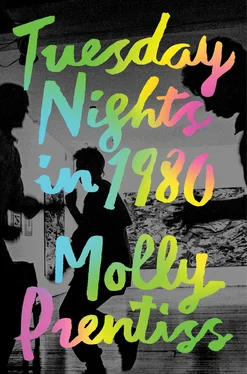Outside, someone yelled, “Four minutes!” which was followed by a giddy buzz of chatter. A man in a ruler-wide red tie circled with a bottle of Veuve Clicquot, topping off people’s skinny glasses. Marge looked up at James. She was shivering and smiling. James felt the chill of the night on his cheeks, felt Marge’s soft body leaning in against his.
“Our year,” Marge said.
“Our year,” James echoed, but his mind was back inside. Who was that man? And how could James make his way back into Winona’s convent to find out? He’d bathroom-break himself away from Marge, through the crowd, the glass doors. He’d slither up to the blue room, peek his head inside. No one would be there, but the residue would have lingered: like when you close your eyes against the glare but the shape of the sun is still there. The man would be gone, but James would find him again. He would scour the party and the city until he did. But not before he kissed his beautiful wife, just as the clock moved the world into a new decade. Not before, somewhere in the distance, a ball was dropped.
Just hours before midnight, at the squat on East Seventh Street, Raul Engales was in the corner of the Big Room, being touched on the biceps by two barely dressed women. Some people called him a ladies’ man, which he didn’t mind because it was true. His looks alone — warm skin, squinted umber eyes, restless eyebrows, and a swell of jet-black hair — gave women the impression that he was as sensitive as he was serious, that his passion would outweigh his pitfalls, and that he would transport them, by way of the thick, chugging train of his shorter-than-average-but-somehow-still-dominating body, to some exotic locale that they’d never even heard of. He knew this, just as he knew the power of the mole on the right side of his face, that pointless piece of black flesh that he had once hated but had come to cherish; it seemed to have some sort of planetary pull. He kept the women who gravitated toward it in his orbit only long enough to enjoy the pleasure of them; anything beyond pleasure was not worth his time. Women are like painting, he had been known to say if he was drunk enough. You want to live inside them while you are doing them. Then maybe you never want to look at them again.
It was New Year’s Eve, the squat’s annual blowout party. Hardly necessary to nominate it as such, Engales thought, since every night at the squat was a party, blowout or otherwise. He was here not because he especially wanted to be but because he was always here. The squat, with its seven to twelve rotating residents, had become a sort of second home for Engales. Its core inhabitants: nonmonogamous conceptual artists Toby and Regina, performance artist and chain-smoker Horatio Caldas, sculptor and throat singer and professional grower of her own hair Selma Saint Regis, Swedish twins named Mans and Hans who had immaculate bodies and a propensity for lighting things on fire, three flamboyant parrots who squawked not-your-average obscenities at newcomers ( Baby’s balls sack! Mongoose! Rug muncher! Failed artist! )… this was who he surrounded himself with. They were a family of misfits, and he was what they referred to as an “orphan”: one of the myriad artists whom they had agreed to take in, get drunk, talk about and make art with, but who didn’t live on the premises. This was the case not only because he had been gifted a rent-free apartment by a friend-of-a-friend Frenchman, but also because he didn’t believe in shitting where he ate. As with his women, he sought pleasure, not headache, and with any commitment to anyone else, such as living in a cement-floored, windowpane-less ex-factory with ten other people, headache was inevitable.
Now, though it was hardly nine, Engales could already feel an energetic fuss in the room: the frenetic vibrations of people trying to place themselves in proximity to the right lips before midnight, so that when the time came to enter into the future they would not have to do it alone. But lips did not concern him just now; he had his pick of two pairs, and neither was appealing. The two women, whose sentences were all spoken like questions, were not holding his attention. He scanned the crowded room for something that might, and though many things were attention- grabbing —Selma painting her nipples with glow-in-the-dark paint, one of the Swedes lighting a clear liquid on fire in a small glass — none of it was attention- holding. Raul itched for something novel, something revelatory. It didn’t have to be a woman. It was the brink of a New Year, and he longed to cross over into it a new man. A man people knew about, paid attention to. Not only a ladies’ man, but a people’s man. Someone who mattered. A real artist.
At the edge of the room, just near the door, he saw the top of a hedge of hair, floating into the crowd. He recognized the hair: huge and effervescent, dominating. It was Rumi Gibraltar, who he had met outside a party last summer; she had been lounging on the stoop outside the building as if it were a daybed, in a shirt that looked to have been made from lacy napkins. Rumi, the curator who had promised him she’d come to his studio to see his paintings. Rumi, who had not kept that promise. Rumi, whose lips he would put himself in proximity to sometime before midnight, if not for pleasure then for business: he needed her to get him a show.
The woman on his right reached her face up toward his, lips first. He ignored her and shed both of the women as if they were clothing, making his way toward Rumi. She was taller than him and regal. Her hair was a masterpiece.
“Well hello, Ms. No-Show,” he said when her eyes found his.
“Well hello, Mr. Delaroche,” she said. She was referencing the night when they had met, when Engales had professed to her that he was a painter, and she had said to him flatly, “Don’t you know that painting is dead?”
When he appeared confused she had gone on: Didn’t he know Delaroche? No? Well he should look him up, because painting has been dead since 1839! When Engales had looked it up, in an encyclopedia at the NYU library the following week, he had found that Paul Delaroche had declared the whole form of painting obsolete after the invention of an early form of photography.
“I found his old ass in the encyclopedia,” Engales said now.
“A studious one,” she said.
“His argument doesn’t hold up.”
“Doesn’t it?”
“There are two kinds of painters. The painter who paints to decorate, and the painter who paints to paint. Photography would only make any sort of problem for the first kind of painter.”
“A studious and actually smart one. Good combination.”
“Why haven’t you come to see me?”
“I am a very busy woman,” she said, her eyes leveling into him, filled with what looked like lusty promise.
“I like busy women,” he said.
“Me, too,” she said.
“I have a good idea,” Engales said impulsively.
“Artists always think they have good ideas.”
“Come see my paintings now. Come to my studio.”
“It’s New Year’s Eve,” she said.
“An observant one,” he said.
“We’re at a party,” she said.
“Don’t you know that parties are dead?” he said.
Rumi smiled with one half of her mouth: her first concession.
Before she could protest, Engales grabbed her thin arm, took her out into the icy night. Rats pitched from their path as they made their way across town on East Seventh. The cops were out in packs, scanning arrogantly, braced for the worst after what had happened last year: mobs in Times Square, a few murders, even. A woman on Broadway called to a man she was separating from regretfully, “Midnight! The Eagle! Find me! You promise?” Up Broadway to Washington Place, where it crossed with Mercer, through the locked door and up the dark stairwell to the studio Engales had come to call his own.
Читать дальше












